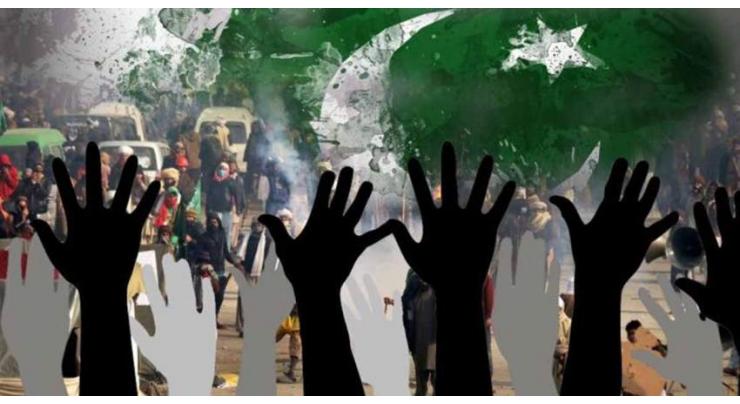
Human Rights Situation In Pakistan: A Comprehensive Analysis
Abdullah Hussain (@Abdulla99267510) Published December 10, 2023 | 06:18 PM

In addition to the prevailing human rights challenges in Pakistan, abuses against women and girls further highlight systemic issues.
The Constitution of Pakistan provides for fundamental rights. The Clauses also provide for an independent Supreme Court, separation of executive and judiciary, an independent judiciary, independent Human Rights commission and freedom of movement within the country and abroad.
However, these clauses are not respected in practice. Enforced disappearances remain a grave concern, particularly targeting human rights defenders, journalists, and critics.
Freedom of assembly faced severe restrictions, marked by harassment, arrests, and unlawful force against protesters and journalists. Tightened control over media, including arrests and charges against journalists, further erodes freedom of expression.
In addition to the prevailing human rights challenges in Pakistan, abuses against women and girls further highlight systemic issues. Endemic violence, encompassing rape, murder, acid attacks, domestic violence, and forced marriage, disproportionately affects women. Shockingly, an estimated 1,000 women fall victim to so-called honor killings annually, underscoring the severity of gender-based violence. The high-profile case of Noor Muqadam's torture and murder in July triggered nationwide protests. The subsequent arrest of Zahir Jaffer, a childhood friend whose marriage proposal Muqadam rejected, brought attention to the pervasive nature of gender-based violence. Furthermore, Child marriage persists as a serious concern, as per Pakistan Social Living Standards Surveys, (2018-19) 21% of girls marry before age 18, and 3% marry before age 15. Religious minority communities, particularly women, remain vulnerable to forced marriages without sufficient government intervention.
Pakistan's standing on the Global Gender Gap 2021 index, ranking 153 out of 156 nations, underscores the significant gender disparities. Moreover, children's right to education faces challenges, mostly girls, out of school even before the pandemic.
The closure of schools due to COVID-19 exacerbated these issues, impacting millions of students, particularly due to poor internet connectivity hindering online learning.
A targeted social media campaign against the transgender community in Karachi, leading to violence, exemplifies the need for comprehensive legal protections. In 2022, Freedom House rated Pakistan's human rights at 37 out 100 (partly free).
The multifaceted challenges in women's rights, children's education, and transgender rights underscore the urgent need for comprehensive legal reforms and concerted efforts to foster a more inclusive and rights-respecting society in Pakistan.
Religious freedom confronts challenges, with blasphemy allegations triggering violence. The Supreme Court's acknowledgment of due process violations in blasphemy cases underscores systemic issues. Despite the Transgender Rights Act of 2018, transgender individuals face continued discrimination and violence. Forced conversions, discrimination against religious minorities, and other marginalized groups underscore systemic challenges demanding urgent attention.
In conclusion, Pakistan stands at a critical juncture, grappling with a multifaceted human rights crisis but still Pakistan is not a hopeless case, and that there remains some reason for optimism in looking toward the future. We need to empower the people, media and to strengthen the civil society, upgrade the education system, and foster an independent judiciary. Urgent reforms, accountability mechanisms, and international engagement are imperative to address these challenges comprehensively and build a rights-respecting society.
The writer is Marium Amjad Khan, based in Islamabad
Related Topics
Recent Stories

Currency Rate In Pakistan - Dollar, Euro, Pound, Riyal Rates On 27 April 2024

Today Gold Rate in Pakistan 27 April 2024

HEC reviews curricula for environmental sciences degree programme

ICC Asia looking forward to an action-packed Asia Cricket Week

Yuvraj Singh named ICC Men’s T20 World Cup 2024 Ambassador

Greece hands Olympic flame to 2024 Paris Games hosts

Two Kyiv hospitals evacuating over feared Russian strikes

World must act on neurotech revolution, say experts

Charles & Catherine's cancer diagnoses

Champions Alcaraz and Sabalenka through in Madrid Open

King Charles to resume some public duties during cancer treatment: palace

US defense chief announces $6 bn in security aid for Ukraine
More Stories From Blog
-

The Economic Challenges for the New Government
1 month ago -

How a Second Passport Can Enhance Your Travel and Business Opportunities
1 month ago -

Reading Minds
2 months ago -

Climate change poses imminent threat to global biodiversity
5 months ago -

Unprecedented floods in Pakistan
8 months ago -

Sonia Ahmed's vision elevates Miss Pakistan to Global prominence
8 months ago
-
Armed forces, intelligence agencies protecting country’s fabric from proxy wars: experts
11 months ago -

Lawmakers denounce strongly Indian nefarious move for Yasin Malik’s sentence
11 months ago -
Written in blood: a poignant story of our invincible warriors, martyrs
11 months ago -

Proportial voting in Pakistan
1 year ago -
Three Jewels fading from Lahore’s architectural crown
1 year ago -
Empowering women – a key to societal transformation
1 year ago







